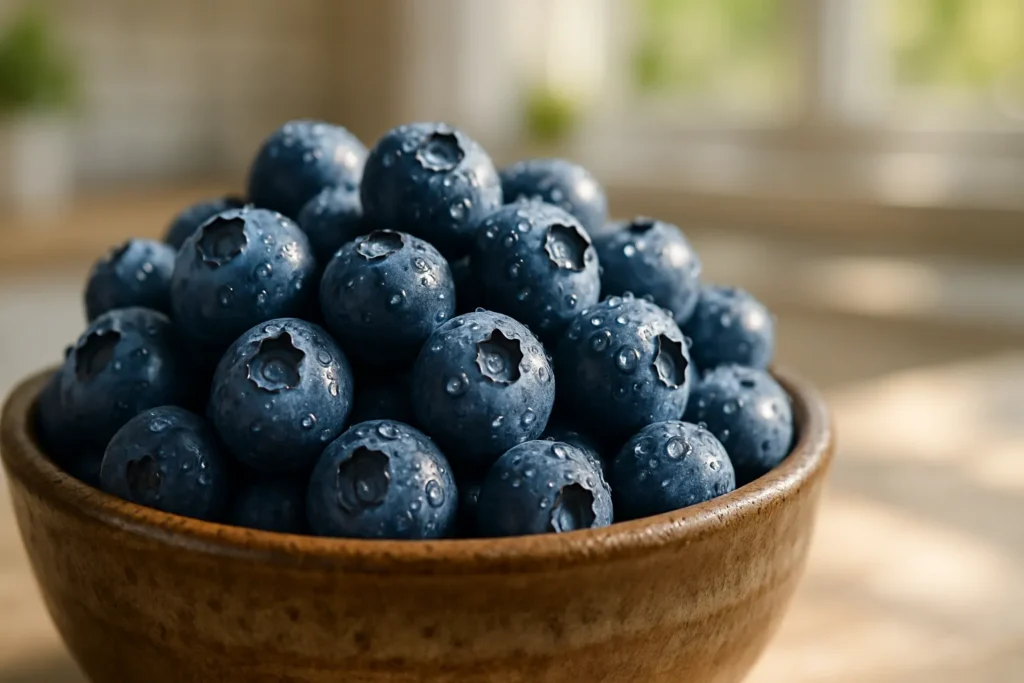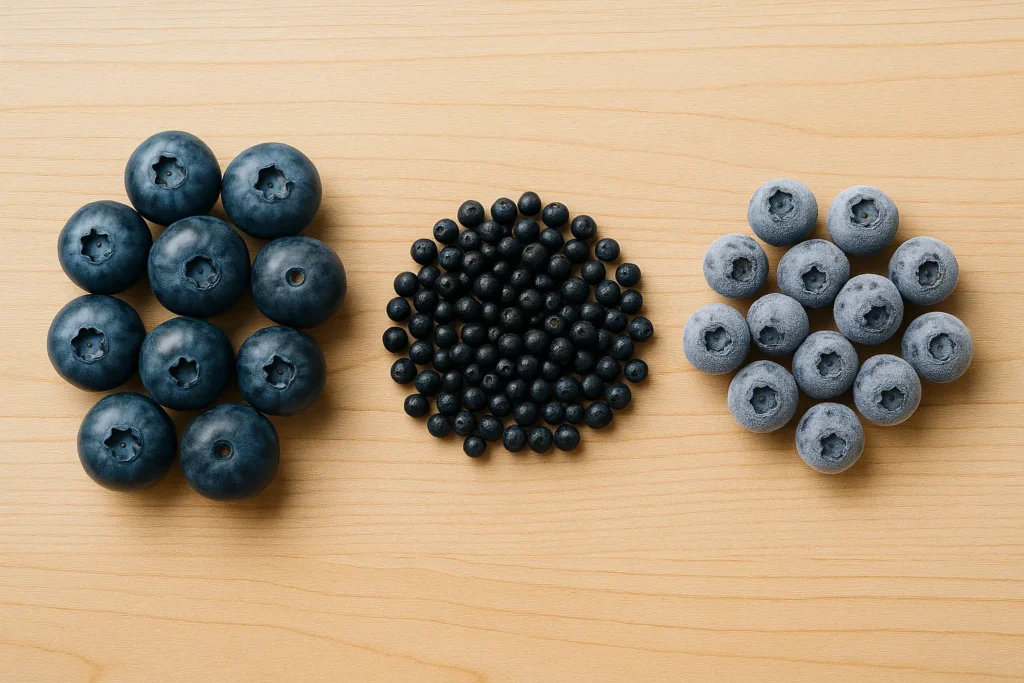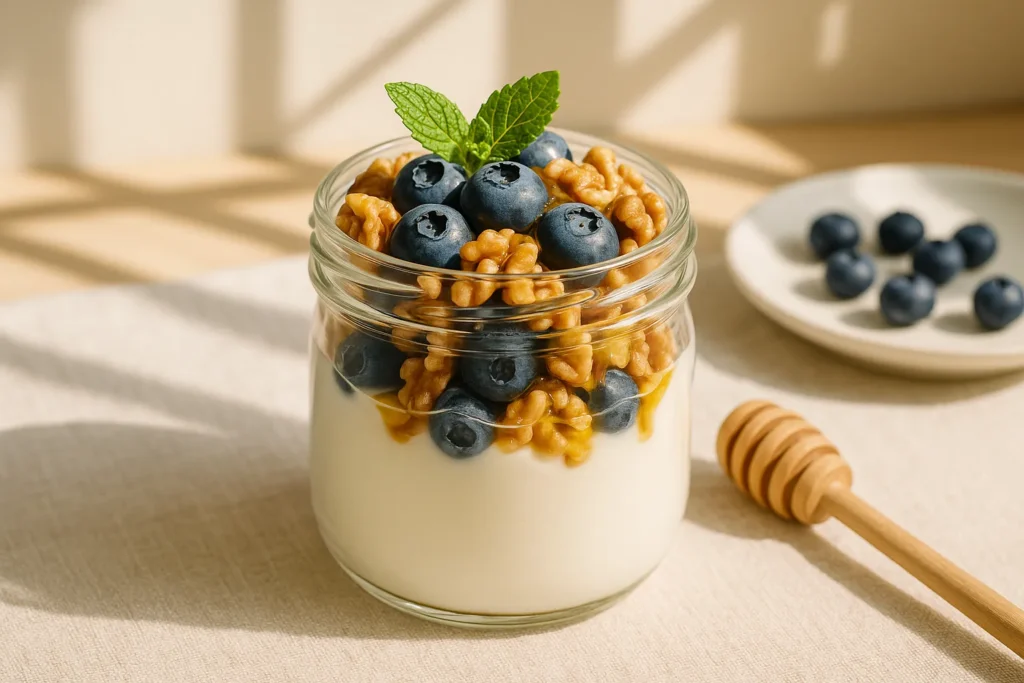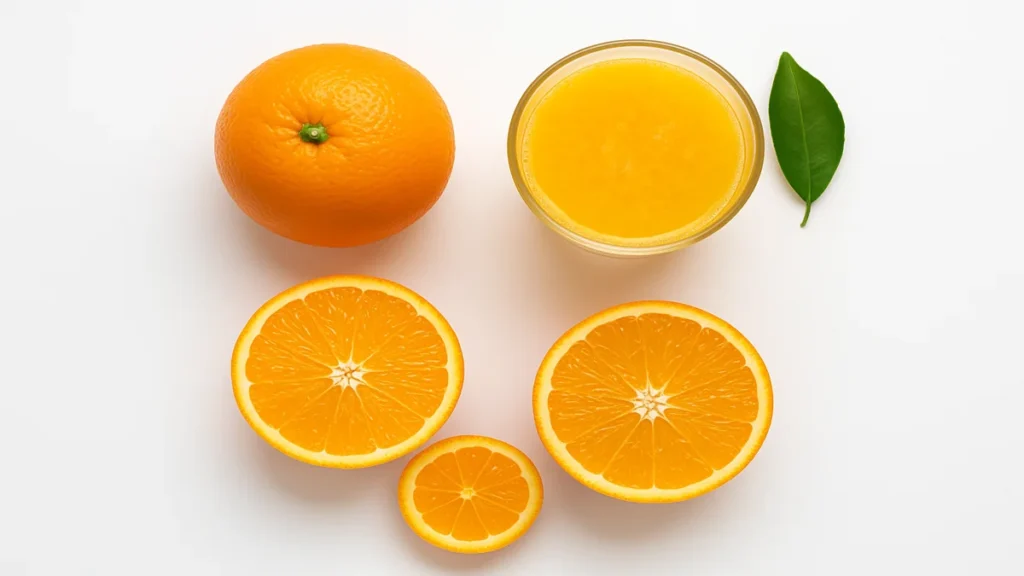
Are blueberries healthy?
The Short Answer: Yes, absolutely. Blueberries are widely considered a global superfood. 1 They are low in calories but rich in fiber, vitamin C, and vitamin K. Most importantly, they possess one of the highest antioxidant levels of all common fruits and vegetables, primarily due to anthocyanins, which support heart health, brain function, and blood sugar regulation. 2
You’ve probably heard the buzz, but this tiny fruit delivers much more than a sweet snack. Whether you’re tossing them into smoothies, topping oatmeal, or grabbing a frozen handful, blueberries bring serious nutritional firepower to your plate.
From antioxidant richness to gut and heart support, blueberries have earned their reputation as a daily wellness staple. However, not all blueberries are created equal. Jumbo vs. wild and dried vs. frozen—each form has its own nutritional profile.
In this guide by Bitebene, we explore the evidence-based benefits, nutritional facts, and the best ways to eat them.
Table of Contents
Top 7 Health Benefits of Blueberries
1. Antioxidant Powerhouse (King of Antioxidants)
Blueberries are packed with anthocyanins, the pigment responsible for their blue color and their powerful health effects.3 These antioxidants combat free radicals, reducing oxidative stress, which can damage DNA.4 Wild blueberries, in particular, contain significantly higher antioxidant levels than cultivated ones.

2. Gut Health Support
Are blueberries good for digestion? Yes. Thanks to their fiber and polyphenol content, blueberries act as a prebiotic, feeding the “good” bacteria (microbiome) in your gut.5 Regular consumption is linked to better digestion and reduced gut inflammation.6
3. Heart and Blood Sugar Support
Despite containing natural sugar, blueberries are excellent for blood sugar management.7 Research suggests they improve insulin sensitivity, making them a smart fruit choice for those managing prediabetes or type 2 diabetes.8 Additionally, anthocyanins may help lower blood pressure and reduce LDL cholesterol oxidation.
4. Brain Function and Memory Boost
They are often called “brain berries” for a reason. Studies indicate that eating blueberries may delay mental aging and improve memory.9 The antioxidants tend to accumulate in areas of the brain essential for intelligence, helping to maintain brain function in older adults.
5. Skin and Anti-Aging Benefits
Want glowing skin? The high vitamin C content supports collagen production, which smooths wrinkles and improves skin texture. Meanwhile, antioxidants protect the skin from damage caused by sun exposure and pollution.10
6. Weight-Friendly and Low in Calories
With roughly 80 calories per cup, blueberries are a high-volume, low-calorie food. The fiber content (about 4 grams per cup) helps you feel full longer, reducing the urge to snack on processed foods.
7. Essential Support for the Elderly
Are blueberries healthy for the elderly? Absolutely. They address the “trifecta” of aging concerns: preserving bone strength (via vitamin K and manganese), supporting heart health, and maintaining cognitive function.
Nutrition Facts Table
Based on 1 Cup (148g) of raw blueberries (Source: USDA)
| Nutrient | Amount | % Daily Value (approx.) |
| Calories | 84 | – |
| Carbohydrates | 21 g | 8% |
| Dietary Fiber | 3.6 g | 14% |
| Sugars | 15 g | – |
| Protein | 1 g | 2% |
| Vitamin C | 14.4 mg | 16% |
| Vitamin K | 28 mcg | 24% |
| Manganese | 0.5 mg | 25% |
| Fat | 0.5 g | 1% |
Note on Vitamin D: Do blueberries contain vitamin D? No. Blueberries naturally do not contain vitamin D, but they pair perfectly with vitamin D-fortified yogurt or oatmeal.
Are Frozen, Jumbo, or Wild Blueberries Better?
When shopping, you’ll face choices. Here is how they compare for your health:

- Are Wild Blueberries Good for You?
- Verdict: The Best Choice.
- Why: They are smaller with less water content, meaning they have double the antioxidant capacity and more intense flavor than cultivated berries.11
- Are Frozen Blueberries Healthy?
- Verdict: Excellent.
- Why: They are often flash-frozen at peak ripeness, locking in nutrients.12 Some studies suggest frozen blueberries have higher anthocyanin availability than fresh ones sitting in a fridge for days.
- Are Jumbo Blueberries Healthy?
- Verdict: Good.
- Why: While delicious and great for snacking, they have a higher pulp-to-skin ratio. Since most antioxidants are in the skin, they are slightly less nutrient-dense than wild ones but still very healthy.
- Are Dried Blueberries Healthy?
- Verdict: Eat in moderation.
- Why: Watch out for “added sugar” on the label. Freeze-dried (unsweetened) is a better crunchy alternative that retains most nutrients.
Culinary Uses and Global Popularity
Where Are They Grown?
- USA: The global leader (Michigan, Oregon, Washington).
- Canada: Famous for vast wild blueberry fields in Quebec.
- Europe/Asia: Rapidly growing popularity in Poland, Peru, and Japan.
Best Ways to Eat Them:
- The Metabolism Booster: Oatmeal with walnuts and blueberries.
- The Post-Workout: Smoothie with banana, protein powder, and frozen wild blueberries.
- The Hydrator: Infused water with smashed blueberries and lemon.

Bitebene Tips (Experience & Expertise)
- The “White Dust” is Good: That waxy coating on the skin is called “bloom.” It acts as a natural barrier protecting the fruit. Only wash it off right before eating.
- Don’t Wash Until Ready: Washing blueberries and putting them back in the fridge encourages mold. Keep them dry to last longer (up to 2 weeks).
- Freezing Hack: If your fresh berries are going soft, wash them, dry them thoroughly, and freeze them in a single layer on a baking sheet before bagging. This prevents them from clumping together.
About blueberries
Are blueberries healthy for breakfast?
Yes. They are low-glycemic, meaning they won’t cause a massive sugar crash later in the morning, making them ideal for sustained energy. 13
How many blueberries should I eat a day?
A general recommendation is one serving (about 1/2 to 1 cup) per day to maximize antioxidant benefits without overdoing sugar intake.
Are strawberries or blueberries healthier?
It’s a tie, but they specialize in different things. Blueberries win on antioxidant (anthocyanin) count. Strawberries win on vitamin C content. Eat both for variety!
Do blueberries contain carbohydrates?
For most people, no. However, people taking blood thinners (like warfarin) should maintain a consistent intake of vitamin K (found in blueberries) and consult their doctor.
Final Bite of Wisdom
So, are blueberries healthy? Without a doubt. Whether you choose wild, frozen, or jumbo, blueberries deliver massive nutritional value. From supporting gut health and brain function to being a weight-friendly snack, this tiny fruit is a giant in the world of wellness.
Next Step: Try adding a handful of frozen wild blueberries to your breakfast tomorrow and feel the difference!
References
- USDA FoodData Central – Blueberries Nutrition
- NIH Office of Dietary Supplements – Antioxidants Overview
- PubMed – Research on Blueberries & Cognitive Function
- Harvard Health Publishing – Brain Foods & Antioxidants
- Cleveland Clinic – Blueberry Benefits & Heart Health
- Mayo Clinic – Healthy Eating & Antioxidants
- American Heart Association – Blueberries & Cardio Health
- CDC – Dietary Fiber & Chronic Disease Prevention


